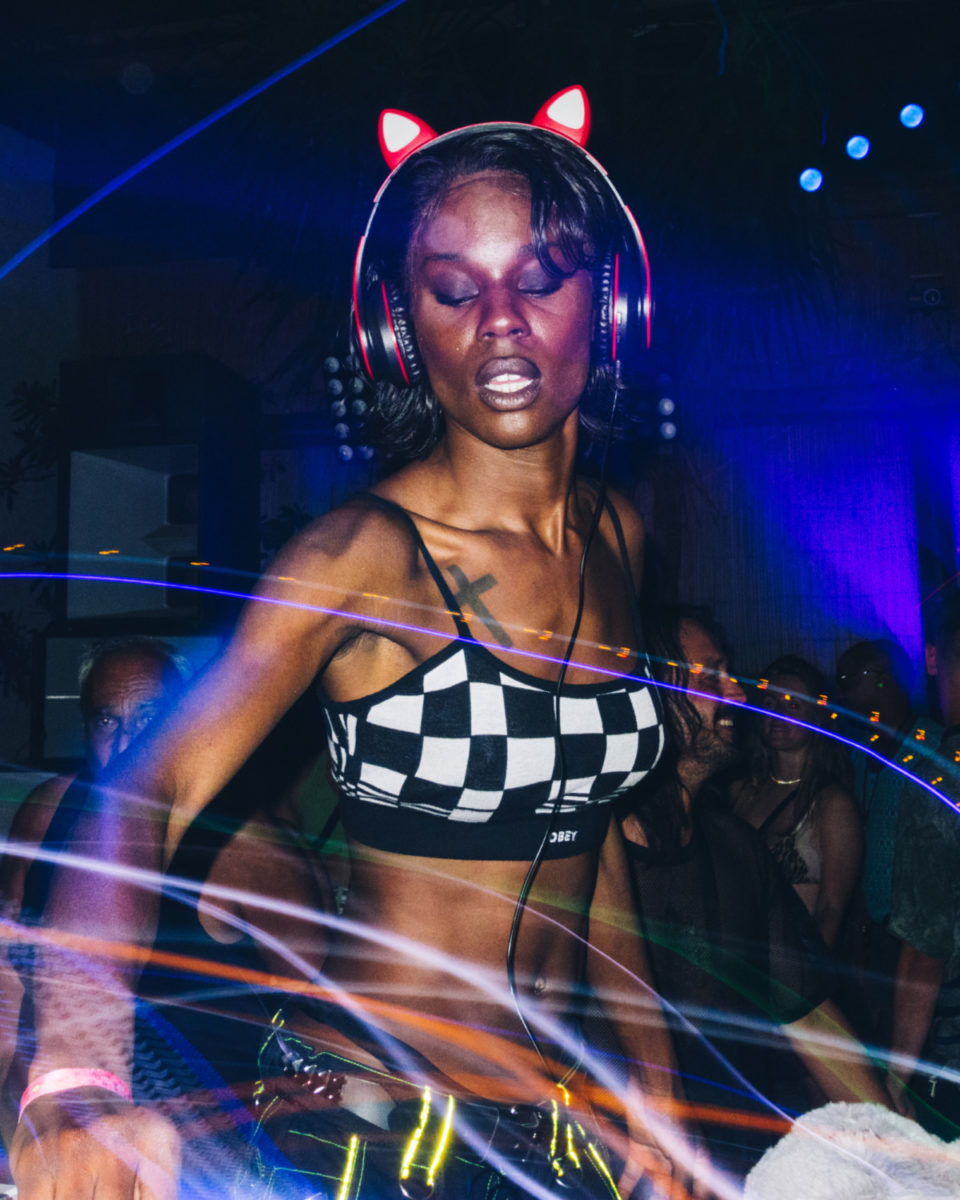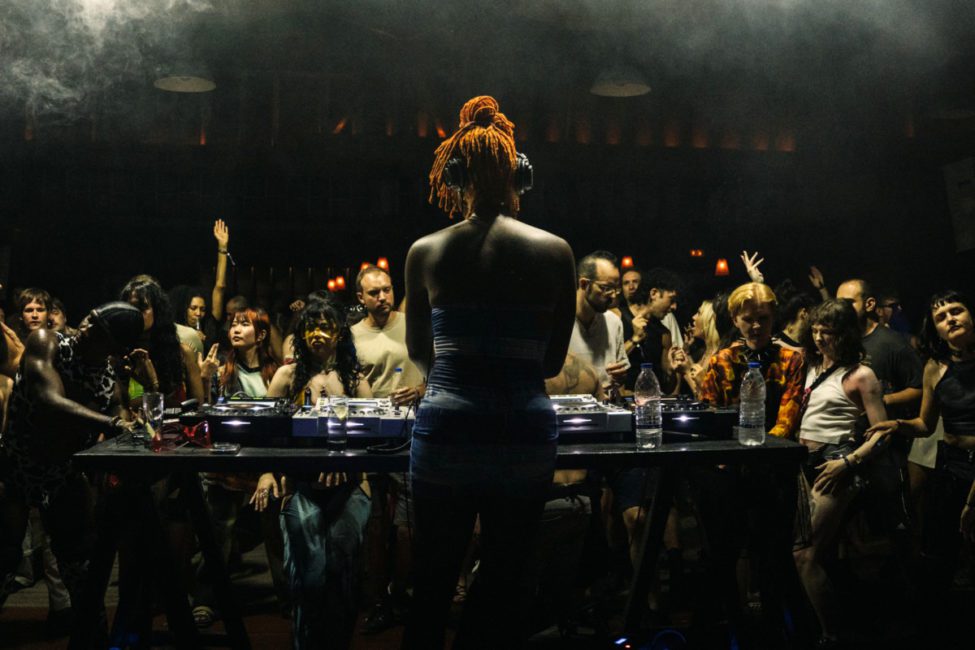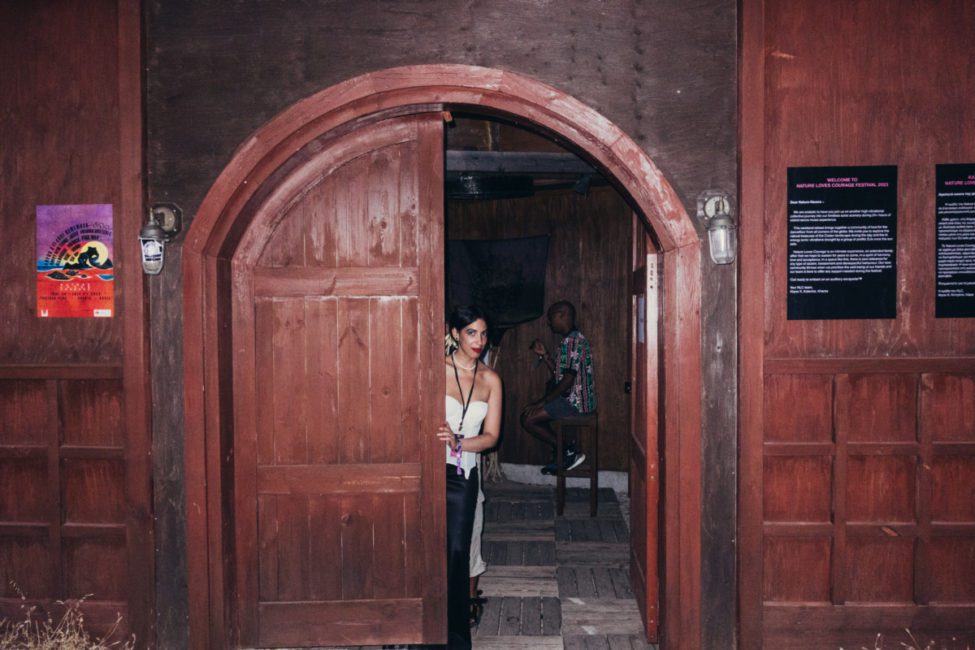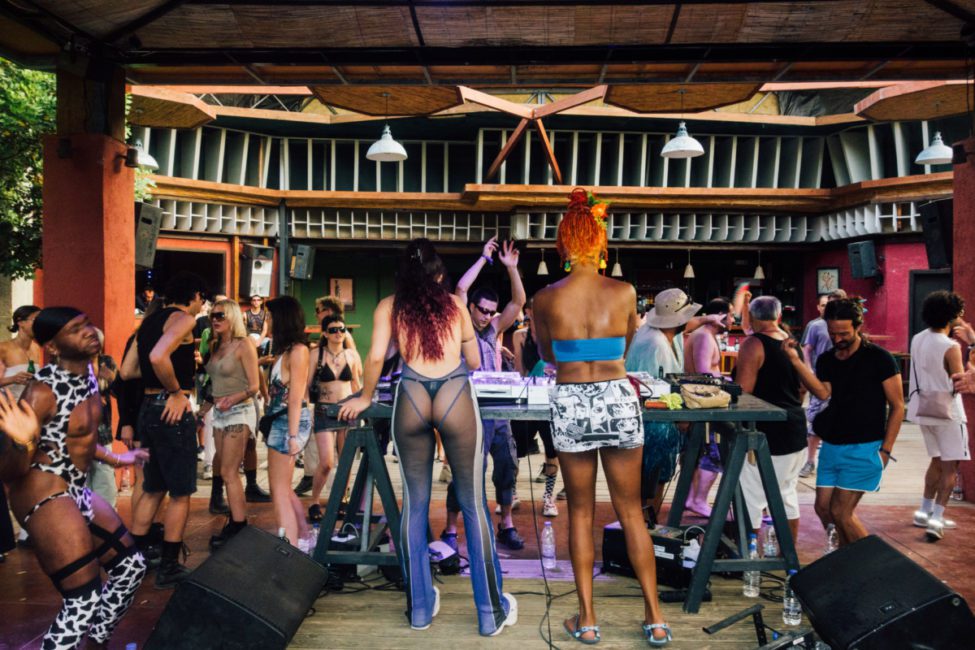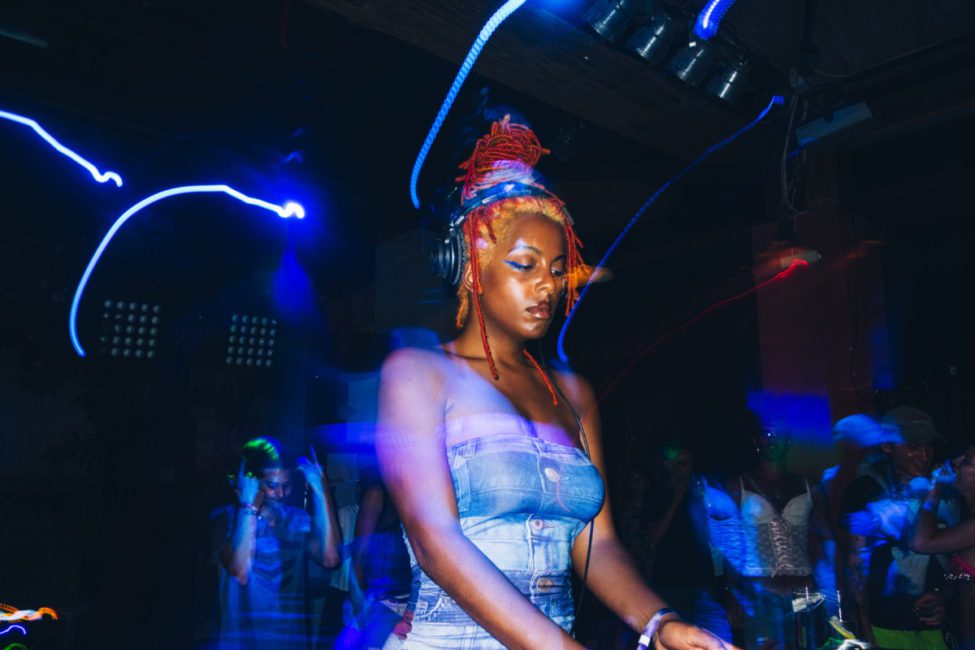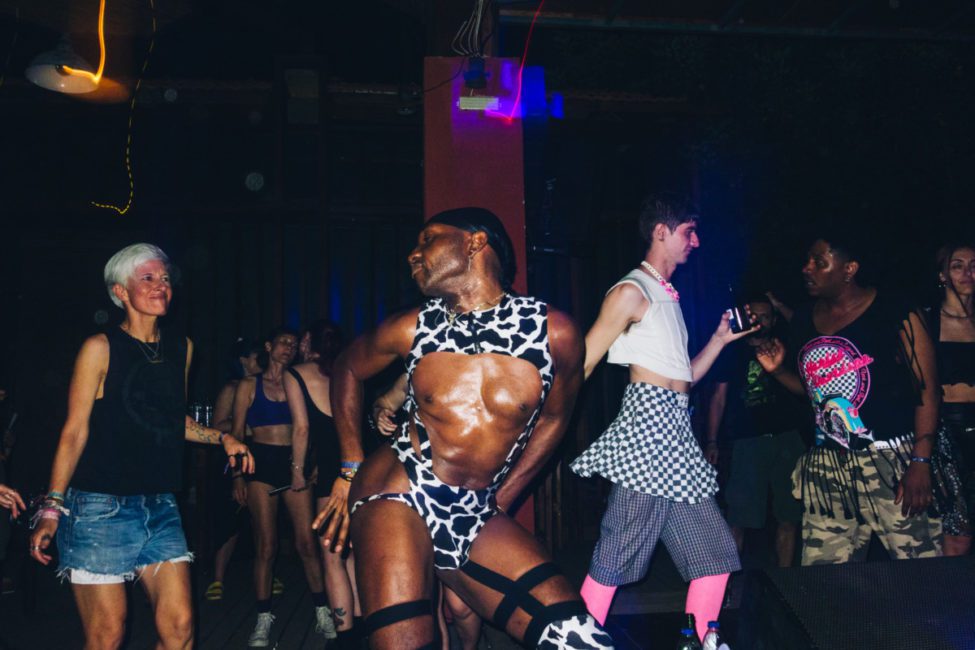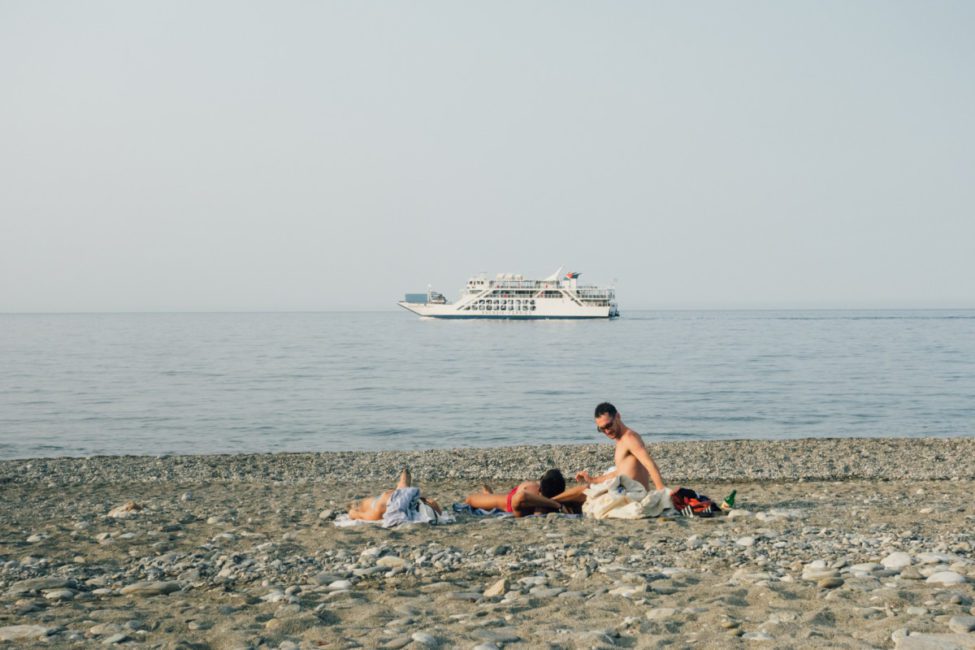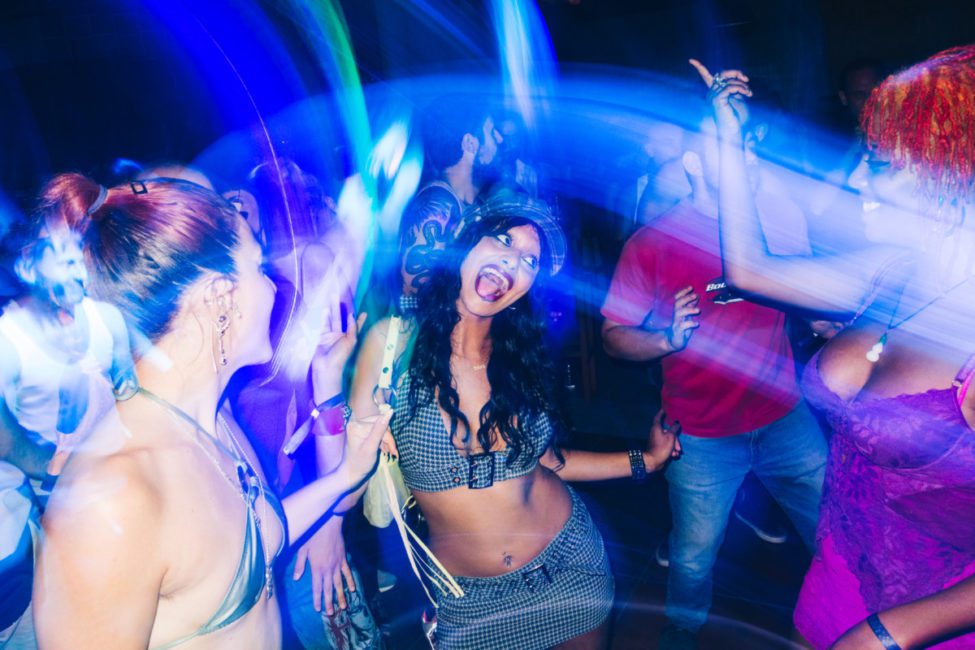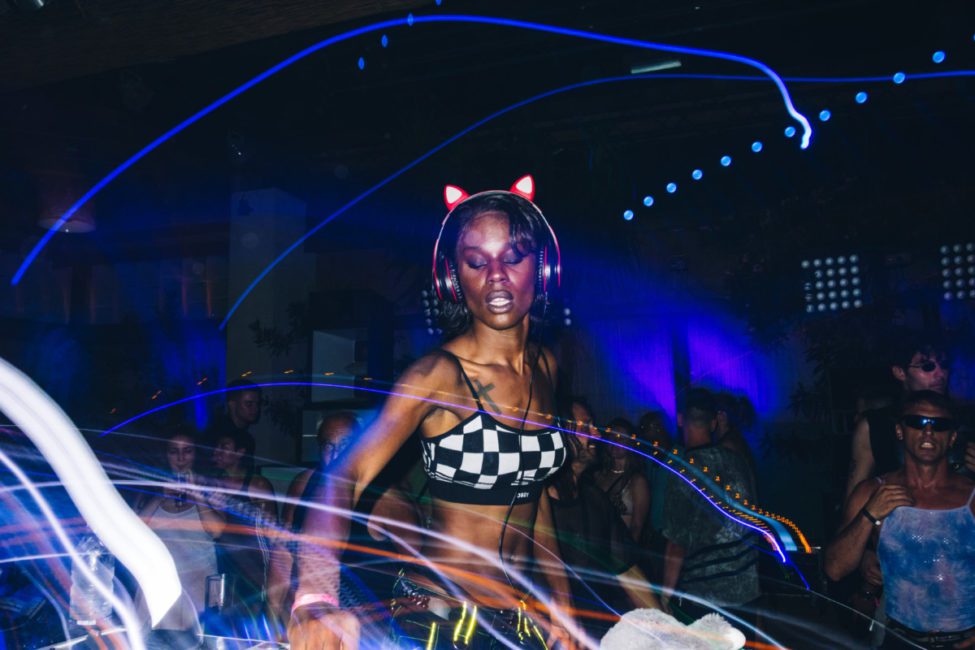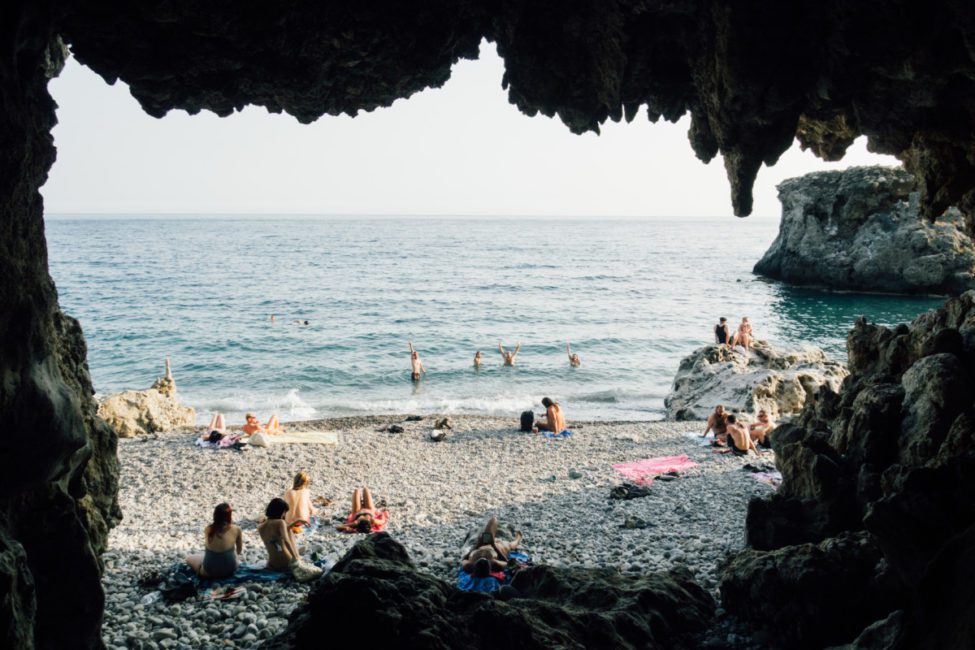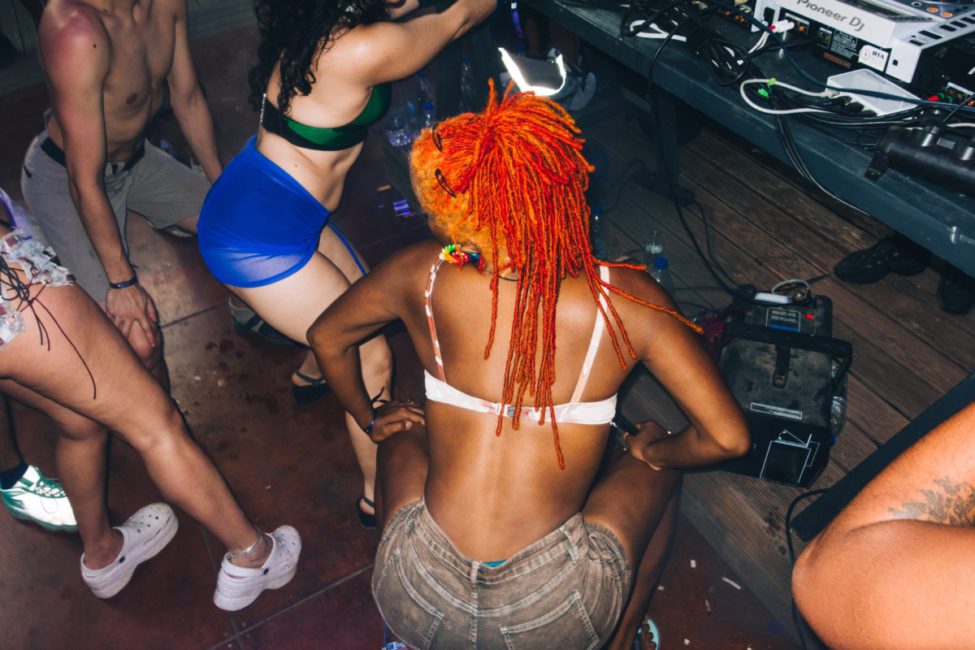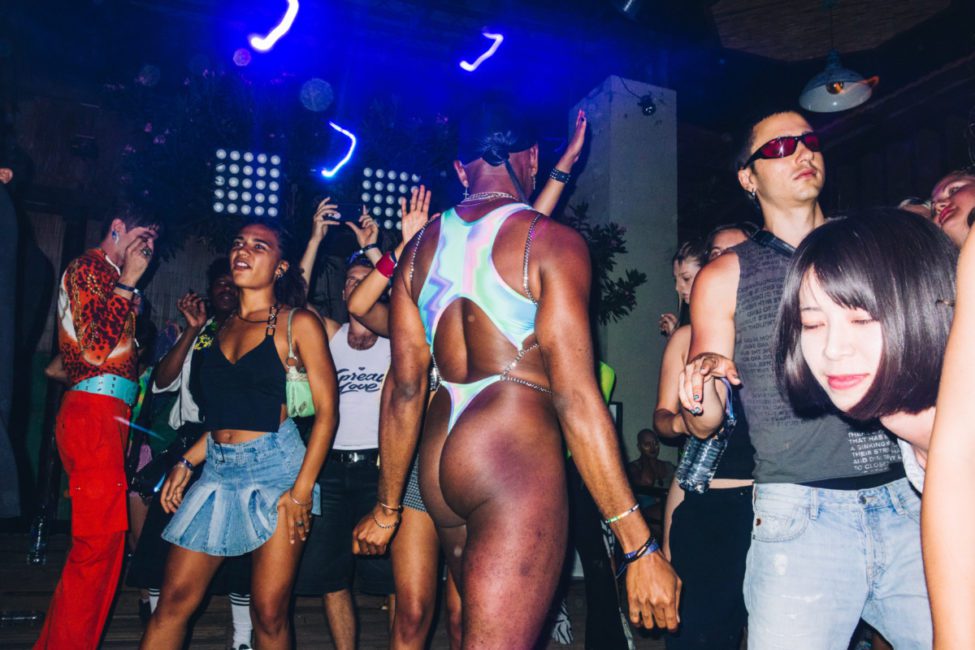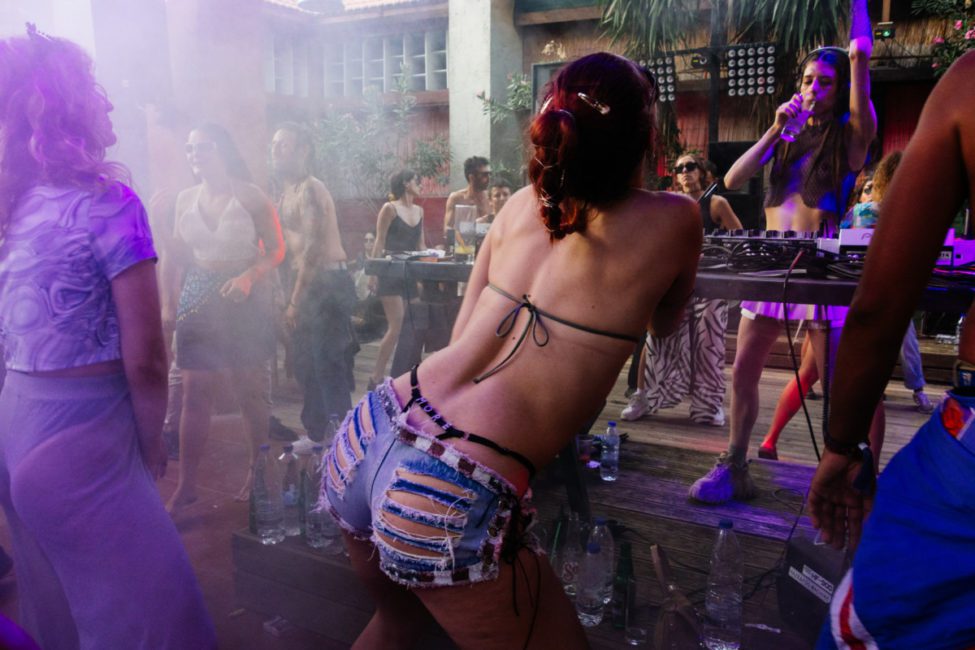This Summer I had the pleasure to attend the fourth edition of Nature Loves Courage Festival in Crete, organised and curated by multi-disciplinary artist Abyss X. The intimate layout of Fortuna Club – where the festival took place, the paradisiac weather conditions of the island, the mix of locals and foreigners in the crowd, and the huge variety of musical styles made the experience one of a kind.
In our interview, Abyss X shares her experience of growing up in the huge metropolis of New York City and being catapulted back to her roots in Crete. We discuss the makings of the festival and the impact it has on the Greek electronic music scene and its community. We also talk over how she is empowering femme artists and giving them more visibility. We conclude with an exploration of her early musical influences and her most recent album, ‘Freedom Doll’.
Interview by Alberto Massaro
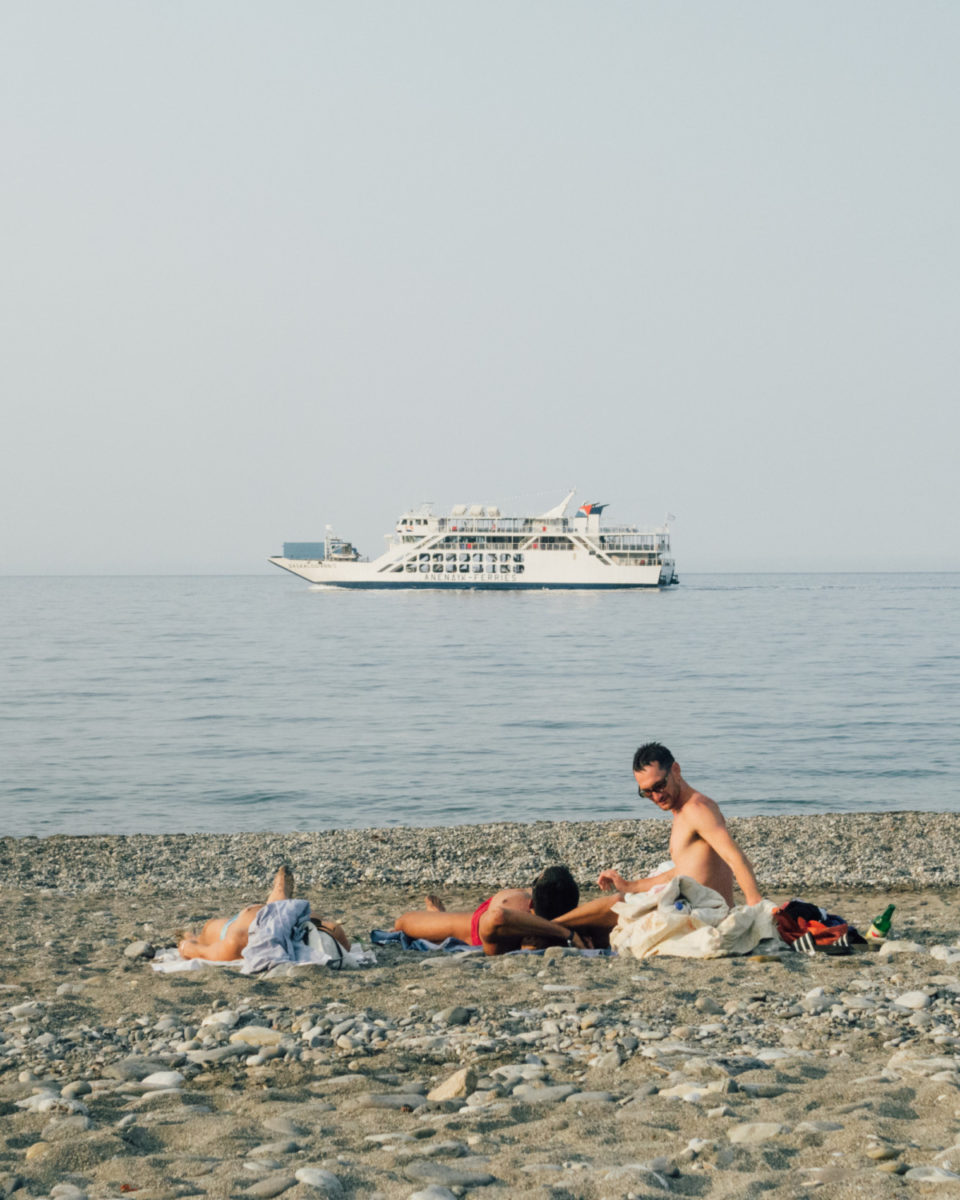
"Nature Loves Courage Festival is a lowkey social experiment – bringing these cutting edge line-ups and a sense of freedom to a village like Sougia is very brave, it requires a lot of finesse"
Hello Evangelia, so lovely to see you again! Thanks for taking the time to chat with me. First of all, I want to say that Nature Loves Courage Festival was so much fun. Totally not what I was expecting, but much better. Even though my friends who have been for the past editions told me it was a unique event, in my head I still had the image of a ‘traditional’ festival. Instead, it felt more like a warm and intimate rave in nature.
Thank you! The reason is that the rest of the team and I don’t really like festivals – they’re too hectic, and we prefer to keep it intimate. This year’s edition of the festival was our first proper summer one and it was amazing. Every year for me is legendary because each edition has a different flavour. We tend to profile artists from Africa and the Arab world as much as we can to build a sonic bridge with Crete.
What was the driving force behind 2023?
It was very challenging as with every year. We had to replace three artists during the week before the event. One had a problem with their knee, another one had Visa problems, the other one had to cancel. Luckily, I have many DJ friends who would’ve attended the festival anyway (such as LINNÉA), and they were happy to cover those slots. But it was very stressful.
Our team is small and we’re massively underfunded, the festival is a DIY endeavour in a secluded location (i.e. Sougia, in the south of Crete). Organising an event on an island and getting artists down there is complicated in terms of flights and accommodation.
But you’ve totally pulled it off. Speaking of isolation, I come from a very small town in Italy, similar ‘middle-of-nowhere’ kind of feeling. When the environment around you is not very thriving, it can be difficult to feel connected to the rest of the world. And it can be tricky to get to experience what’s out there in terms of music or art. How would you describe growing up on an island like Crete? And how did it shape your music influences?
I relocated from New York to Heraklion at the age of 7. It was a major shift, as I was already exposed to so much culture and music in the USA. My parents are both into music, so I learnt a lot from them before embarking on my own journey.
Growing up in Crete was very limiting, as you can imagine. And we’re talking about the 90’s, Internet wasn’t a thing: it existed, but the access we had to it in Greece was very limited compared to other countries. However, it made me very determined.
I had a small radio show at the local University radio station when I was 16. And I was lucky there was one shop that had a plethora of very experimental and underground records, which I raided to find whatever I could. I guess this is what happens to people who grow up in small places: they just become obsessed with their passions, and do everything they can to get a taste of what’s out there.
Is this connection to your Cretan roots the reason why you decided to host Nature Loves Courage in Sougia? Do you see it as an opportunity to give people what you wish you had when you were growing up?
Crete was the ideal location for me to close the circle. I’ve changed so many locations and have been exposed to so many different environments and influences both in my professional and personal life, and I’ve met so many incredible people along the way, that it just made sense to bring all of this back to the island.
Nature Loves Courage Festival is a lowkey social experiment – bringing these cutting edge line-ups and a sense of freedom to a village like Sougia is very brave, it requires a lot of finesse. Again, I am lucky because I know the club (Fortuna Club), as I’ve been going there for the past 15 years.
Sougia has always been a free-spirited place, a destination for hippies since the 1960s who would visit the gorgeous nudist beach. I knew that here I would’ve had the least problems with what I wanted to achieve with the festival, compared to other places where my concepts and ideas would’ve been misunderstood and plain chopped by local communities.
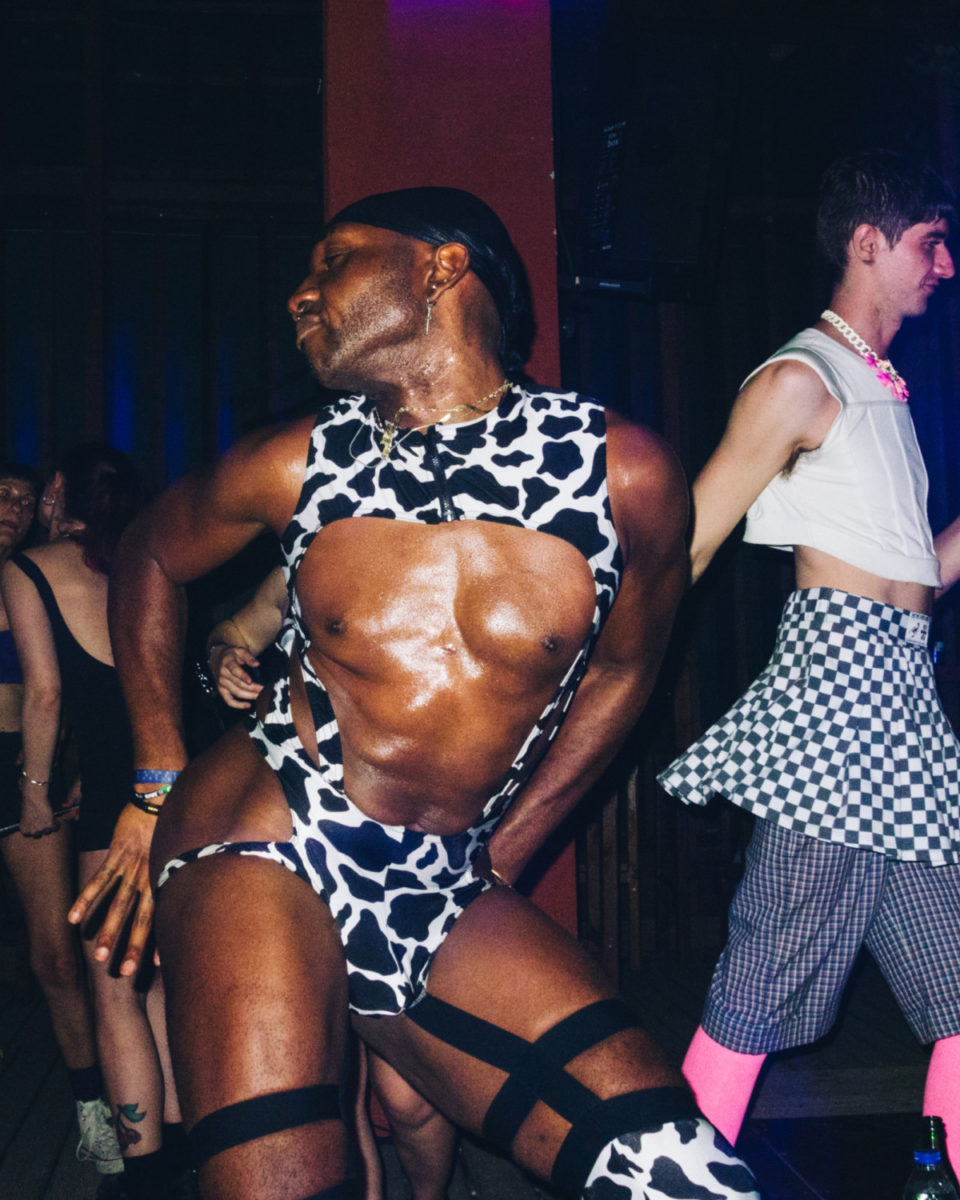
"The objective behind Nature Loves Courage comes from the idea of what I’d like to get at a festival, and I wasn’t getting that anywhere else"
It seems like the festival is very well received by the local community. How did you achieve that?
We have managed to establish a strong connection with the village and its residents. They know who we are, and they respect us. You must’ve seen that some of the villagers even come to the festival! It’s interesting, it’s a crazy interaction. But one must be brave, as there are lots of difficult aspects to it, and limitations that you wouldn’t encounter if you ran a party in a big city like Berlin.
When we started the festival someone decided to build a house next to the club and wanted to shut us down every year. We’d love everything to be easier and smoother in order to focus solely on running the show. But after the festival is over, I always remember that all the tears and suffering are worth it.
As you said, in a bigger city like Berlin you probably would’ve had less issues and more help in creating something like Nature Loves Courage. Why did you decide to keep it a Greece- based endeavour instead?
Even though I love music and dancing, I’m not a huge fan of clubbing. Clubs in Berlin stress me out, I’m not the kind of person who will stay in a dark basement for 72 hours, I’m not interested in that. I’ve always thought there was a big void in the festival circuit in Europe: there’s a need for something more wholesome, more relaxed.
The objective behind Nature Loves Courage comes from the idea of what I’d like to get at a festival, and I wasn’t getting that anywhere else. During the morning hours of this last edition, when JASSS was playing, I stepped outside of the club and re-entered, just to experience what someone entering the space in that moment would witness. When I saw the sun slowly rising, the colourful lights and lasers, and heard the mind boggling sounds, I thought to myself ‘That’s it, this is the kind of experience I want people to have here’. There are many festivals happening in nature, but our festival is Sougia is simply unique.
Why do you think that is? What makes Nature Loves Courage so different from other festivals?
I think the difference is in the fact that one thing is a festival organised by promoters, and another thing is a festival organised by artists. Artists play sets and they know what works and what doesn’t, they know what the crowd wants.
I strongly believe that the atmosphere of an event is primarily dictated by who is organising it. If the person or team starting a festival don’t have imagination and don’t know their audience, then it shows. We are a small team, but we try to make sure that everything is curated, and we always try to think of the experience from a festival-goer’s as well as an artist’s perspective, and make decisions based on that.
This is definitely the feeling I got from Nature Loves Courage, and I believe that the nature of the festival attracts a certain type of crowd. You can find respectful and fun crowds at many events, but it’s rare for me to encounter such a friendly bunch of individuals. We met some people at the festival, and ended up having dinner together a couple of days later for someone’s birthday. The festival is still quite small, but it’s expanding more and more every year. How do you manage to maintain this precious familiar atmosphere?
It’s probably because I don’t do PR or promotion, other than a particular style of sharing on social media that has a very personal vibe to it. Most people come because they’ve heard of it via word of mouth – I love that.
The capacity of the venue is 500 people, but we always try to cap it around 350-400 in order to allow everyone to have enough space to dance and move around. I’m not interested in having a cramped venue where people can’t breathe. We’re lucky that every year someone decides to review the festival and that gives us some extra exposure, but that’s pretty much it.
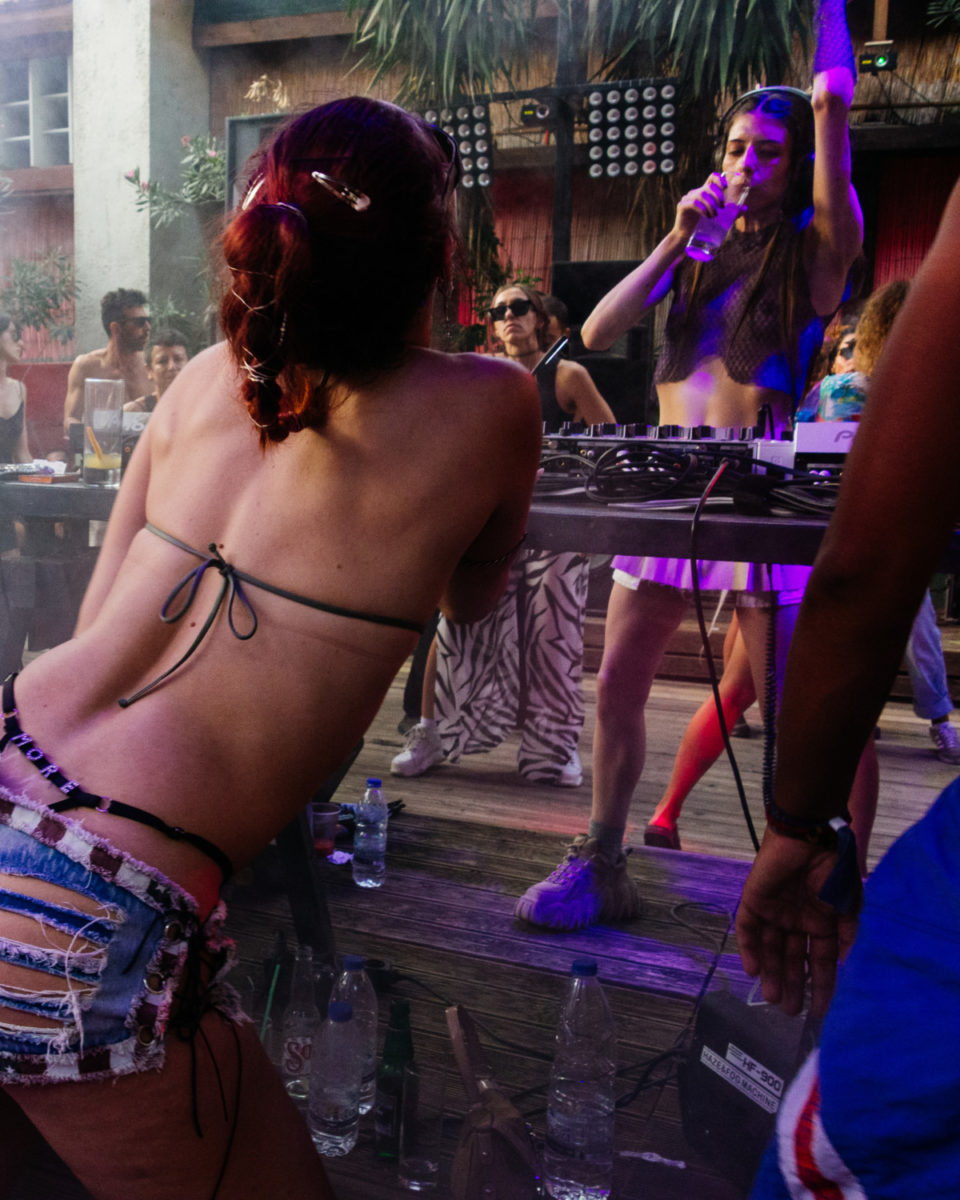
"I strongly believe that the atmosphere of an event is primarily dictated by who is organising it. If the person or team starting a festival don’t have imagination and don’t know their audience, then it shows"
I believe that, somehow, the island has something to do with this magical atmosphere. The natural landscape in Crete is simply breath-taking. Do you think that nature plays a part in this?
Sougia is a blessed place and the weather during the festival is always perfect regardless of when in the year we do it. We had some rainy and windy days before or after the festival dates, but it always ends up being sunny and warm for the event. It must be the Minoan energy, there’s definitely something magical.
The village has something extraordinary about itself too. Despite the mass tourism happening around the island, Sougia has managed to stay true to itself and hasn’t been corrupted by capitalist forces. Behind this phenomenon there’s the villagers’ mentality of trying to keep the place pure and untouched.
The only problem is that there is not enough accommodation for everyone, but that’s OK – people always find a way with camping. Attendees sync with the slow-paced rhythm of the village, they form groups on the beach, they contribute to the intimate atmosphere.
What’s the impact of the festival on the island and the electronic music scene in Crete?
There’s definitely been a lot of action happening at Fortuna Club since the third edition of Nature Loves Courage in 2022: this year, the club is booked every weekend. In this sense, the festival has contributed to putting the club on the radar, and more people are running events there.
I’m not sure about the impact on the Greek electronic music scene. Most parties in Greece are curated by male promoters and the line-ups feature mainly male artists and I personally am not inspired by it. There’s still a lot of work to do in this sense.
Do you see some subtle changes happening in terms of FLINTA* representation in the Greek music industry?
A little bit. Here and there we have femme DJs entering the scene, and I’m always on the lookout to book them for my festival. But there are definitely not enough opportunities for other artists. Hopefully the festival will inspire FLINTA* (women, lesbians, inter, non-binary, trans and agender) artists to throw more parties. I’d love to see an all-FLINTA* line-up when I go to Athens for a party.
What about your own projects?
I have just released my new new album ‘Freedom Doll‘ via London-based record label AD 93. It’s a switch up album where I’m introducing a new sound that leans towards more rock, folk and singer-songwriter ideas.
Why the need for this switch?
All my albums are quite different and experimental, but I’ve somehow been affiliated with the electronic underground music scene. However, I had a full existential moment with my sound during the pandemic. I was asking myself, ‘Am I really fulfilled?’. So I switched it up and took a very different direction where I focused on real instruments and my voice.
When did you start working on ‘Freedom Doll’?
I started in 2021, but it has been an on and off project. Most of it happened in 2022, and then it took a lot of post-production. Recording live instruments is such a different process from sampling pre-existing material. I’ve learnt so much from it, and now I value live concerts with live instruments even more – it makes such a difference.
It’s creatively refreshing to explore different genres and find new ways of doing things. It’s what I thought about the festival as well: every artist had a very different style, but they all mixed together so well and managed to have something for everyone.
Exactly. Ultimately, I just want to keep my creative endeavours playful and interesting.
Photography by Alexandra Masmanidi
